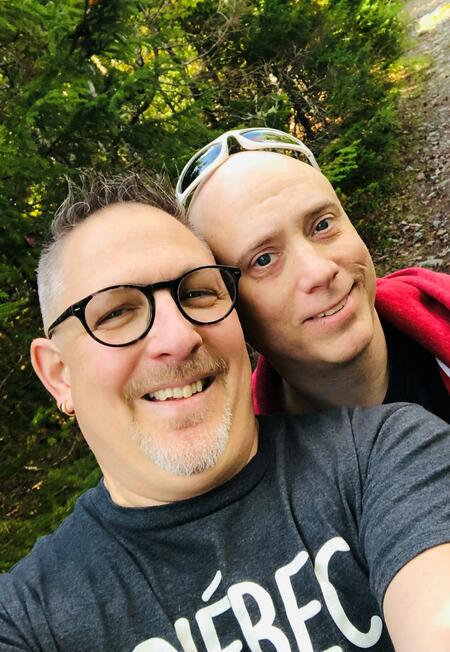
Mo & Trevor
Dartmouth NS
Canada
My husband Trevor and I were at a Mother’s Day brunch with his mom in 2019 when he shot me a worried look after touching the lump on his neck. I shook my head in a silent “not now’ message. Later that day, Trevor told me the lump was getting bigger, and within 6 weeks he’d seen his family doctor and an oncologist, had blood work and a biopsy done, and got the results.
I was with Trevor when he got the diagnosis: Diffuse large B-cell lymphoma (DLBCL). When he heard ‘cancer,’ he shut down, and it immediately became my job to stay engaged with the doctor, while trying to bring Trevor back into the conversation.
We were both 44 years old, and five years married, at the time.
Telling our family and friends about the diagnosis was hard, but we did it as a team. We put folks on speaker phone; Trevor would start and then I would step in for the ‘scientific part’ about lymphoma. During the blood cancer experience, Trevor and I regularly posted, together, on a Facebook chat group for immediate family and close friends – updates on his health and treatment.
Especially at the beginning, there were a lot of holes in Trevor’s story – the shock and stress of the diagnosis meant he sometimes misremembered what doctors or nurses said. I thought, if he goes to appointments alone, I’ll never get the full picture. So, I went to everything with him, even his chemotherapy sessions.
Always tried to have a smile and a push for my husband
I’m a pragmatic person and organized. I could take the emotions out and deal with things in the moment for him. I did feel like I had to protect Trevor from my emotions, every day. I put myself on the backburner to take care of things. When I did go to work, I would sit in the parking lot and take a moment. Or sometimes I would share my emotions in my supervisor’s office.
Our biggest hurdle was not knowing enough about the blood cancer experience soon enough. A nurse gave us some literature about The Leukemia & Lymphoma Society of Canada but didn’t really talk about it. I wish we’d been guided to LLSC sooner. It upset me that we didn’t have enough resources closer to the time of diagnosis.
“This is curable” became our mantra, as well as “we’ll get through this together.” We learned early on that DLBCL is a curable blood cancer. After chemo, Trevor had radiation; the treatments were successful.
I always had that smile and push – to push Trevor to do things he didn’t think he could. In turn, I felt supported by Trevor because of the trust he put in me to take care of him.
Last year I got trained as a volunteer in the LLSC’s First Connection Caregiver Support Program to be matched with caregivers going through what I did. Trevor followed by getting trained as a peer-match volunteer to talk to other Canadians diagnosed with a blood cancer.
We just celebrated our 10th wedding anniversary, and we are just about to hit the 5-year mark of Trevor being cancer-free, which is when they call it cured.
Everything we’ve been through has brought us closer. And even though blood cancer was a challenging experience, it wasn’t too hard – I was doing it for the person that I love.